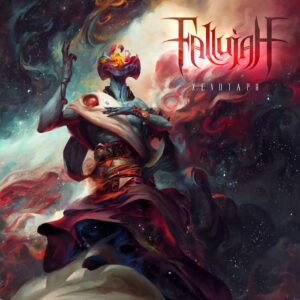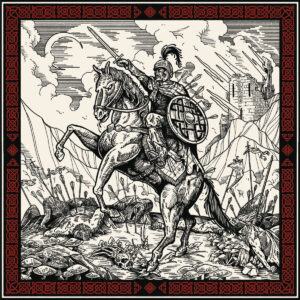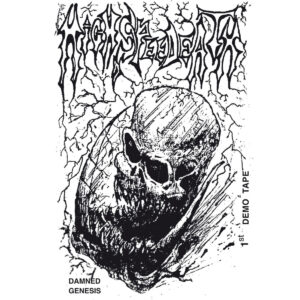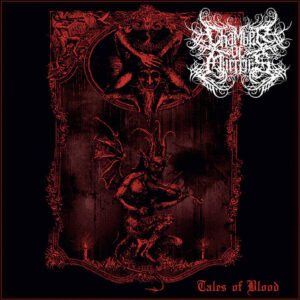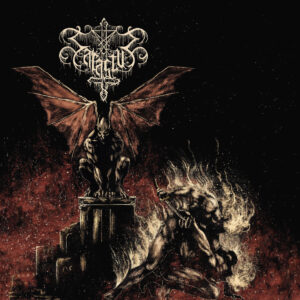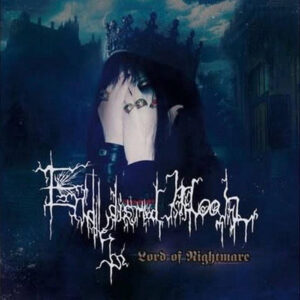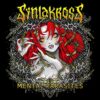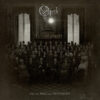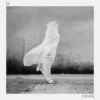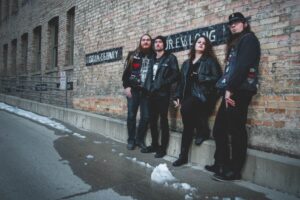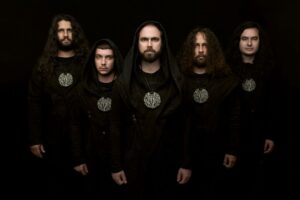Jarvis Leatherby
Cirith Ungol
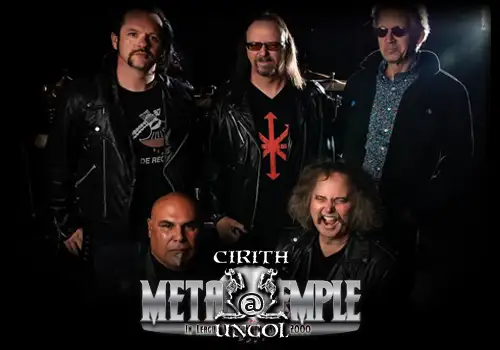
The band I'm most known for is NIGHT DEMON, the band that I sing and play bass for. We're from Ventura, California. It's a Southern California beach town, an hour north of L.A. I wouldn't even call it a suburb of L.A., it's far enough removed, especially back in the day. It's kind of its own place. There was no other heavy metal that came out of there except for CIRITH UNGOL. We heard the name growing up all the time, and they were always seen around town. They were known around town as almost a joke in a way, because the hardcore punk scene was really big in Oxnard and the Ventura area and CIRITH UNGOL was like this grandiose, epic kind of metal band. The people weren't having it locally, basically. The band never got any traction locally. I think they were voted worst band in the local polls and the paper.
Internationally, however, they had worldwide distribution from the records that they put out in the 80s. A lot of people knew about them all over the world. They were in magazines and such, but they never toured. They never left California. They played a show in Mexico in 1982, but that was it and that was just a one-off. They never really left the region of Southern California. They didn't go to the Bay Area or anything. When Metal Massacre came out they were supposed to play the release party in San Francisco, but they ended up canceling and METALLICA took their spot. That was when METALLICA played the Bay Area for the first time.
To put it into context, right now you can go on eBay and find an original copy of the "Frost and Fire" album for $100 or $150 dollars. Well, back then, even in the 90s or early 2000's, every thrift store and record store in town had a dollar bin lined with that album. It's crazy. Artists complain about the Internet, by it really helped things explode for bands like this.
Fast forward several decades. I start NIGHT DEMON. We're putting out records on bigger labels, and we're going all over the world. We're finally leaving the island that is Ventura, California, and we're venturing out around the world and discovering all these heavy Metal subcultures that we never knew existed.
As NIGHT DEMON, we had no ambition at all to do this as a full-time band. We thought, "This is for us, the guys in the band." We liked NWOBHM, we wanted to do this kind of stuff, and if we could get a local gig at a bar, that would be great. We had no ambition that anybody was going to care about what we did. So, when we started to travel, we discovered there are people of all ages that are into this and they all congregate at these festivals. There are tons of other young bands, too, and older bands getting back together, doing it. When CIRITH UNGOL broke up in 1992, they stopped, they completely packed it in. It was like 25 years of darkness. Even the drummer Robert Garvin swore he'd never touch a pair of drumsticks again. They swore off the music industry. They were completely disheartened. They went through so much in the 80's, especially on multiple record labels and just getting quote unquote screwed by the record companies and the music industry. Everybody's got that story, right? They were just over it at that point and chalked it up like, "That part of my life is over, and it's buried in a tomb and now I'm going to be a productive member of society."
There's so much history here. I'm trying to tell it as briefly as I can, but throughout the years many people have tried to reunite the band. As all these metal festivals grew in Europe, they would send CIRITH UNGOL offers all the time. Robert Garvin put his phone number on all the original records next to the thank you list. To this day, he still has that landline. He kept the phone line! He gets calls in the middle of the night, people from Greece, from Norway, from all over. "We'll pay you thousands of dollars and you can sleep with our wives" and things like that. They've gotten a ton of offers. Then when it became known that NIGHT DEMON was so connected with these guys — that we knew them, that they were from the same town when we started out — we started seeing magazine articles about us in Germany and stuff that introduced us as "NIGHT DEMON, neighbors of CIRITH UNGOL."
People started to approach me on a higher level and say, "Hey, look, I've tried for fifteen years to reunite this band. I know it's never going to happen, but what can you tell me?" At that point, it became like a mission for me, a personal mission. NIGHT DEMON toured a lot with ANVIL, and we had seen that in film, too. I thought, this can happen, right? We're watching people do it right now. So, I took it upon myself to do it. It took about a decade of convincing, but around 2013 - 2015 is when I really hit it hard. NIGHT DEMON was touring and doing stuff and I could show them proof of people having CIRITH UNGOL tattoos. I'm taking pictures of people all over the world with CIRITH UNGOL tattoos. And I'm like, "Look at all this merchandise. Who's making this? It's not you. So, even business-wise, take control of what goes out there and don't let the bootleggers profit off what you built."
It's a book on its own how this came together. I'll wrap this question by saying, I used to promote a lot of concerts and by going to all these metal festivals all over the world, I realized that California didn't have anything like that for traditional metal. So, I started one in 2015. I called it "Frost and Fire" in honor of CIRITH UNGOL. I asked the surviving members, there are five of them, to come to the festival and sign autographs. I asked them if I could advertise it, and they said yes. A lot of the guys hadn't seen each other in decades. I don't know if there was some beef or there was just a lot of unsaid, unpacked things, but once they got together none of that shit mattered. People flew from all over the world just to meet these guys. They were signing autographs for hours. The whole thing got jumpstarted from there. There's so much more to it, but that's the Cliffs Notes version of it.
First of all, the Metal industry and the music industry are two separate things. The music industry has been dying a terrible, painful death and the Metal industry has been very stable. Part of the Metal industry is the music industry. With Metal, physical albums on all formats — vinyl, CDs, and cassettes — still sell very well. So do books and T-shirts. T-shirts are never going to go out of style. You can't replace T-shirts with anything digital. Digital clothes? Well, who knows? But you don't see the biggest pop stars in the world with a ton of merchandise out there because we live in a society where everybody wants fame.
It's all about themselves. They're not going to idolize other people anymore on their sleeve, but they will buy into a gang or a band or something that makes a statement and stands for something that they feel they're a part of. They will buy into that. Metal has great music and great artwork. That sells that side of it. Plus, we have so many different subgenres of Metal, more than any other genre of music out there. Then you have horror, fantasy, film, all these other things, literature, they all intersect and intermingle with Metal. So, being in a heavy metal band is a sustainable thing if you can appease all those aspects of it. For unsigned, underground bands, they can pay for things themselves or have their fans float them by preorders and such. The model has shifted.
Here's the best way to put it: When you talk about the Internet and technology and stuff, when you talk about the change in the music industry, on the good side there's now a low barrier to entry. We've gotten rid of the gatekeepers. The movie industry is going the same way. Now the other side — and this is the reason why artists aren't making any money on this stuff — are digital streaming platforms like Spotify, Apple, YouTube. These aren't music companies, they're tech companies. That's what we need to understand. They may focus solely on music, on certain areas, but they're not music companies, they're not artists, they're not creators, they're not even content creators. As tech companies they facilitate platforms to deliver other people's art at an embarrassingly low or free price. So, yes, you can make it on your own, but for most bands it's going to be a lot harder than it used to be.
When NIGHT DEMON started touring in 2014, we were homeless for four years. We just stayed on the road, we lived in the van, but we got to a point where we built it up and sacrificed something for it. It was worth it. Now things are starting to roll. You've got to treat it like a business. Now we don't owe the record company. A lot of major bands back in the day were able to tour because they had hits, but the record companies paid for those songs to be hits. They paid for the bands to go on tour. In the end those bands owed the record company millions of dollars. The labels have to recoup that money. If you had a small business and somebody gave you a few million dollars to make your business awesome, you're going to have to pay that money back. I don't really hate the record industry for that. I think a lot of artists like to complain about things that they don't understand or know about. That's just the way business goes.
Musically, my inspiration . . . it's hard these days. I don't even know. I've kind of realized we're all just vessels for creativity. Over the years I've gone through writer's block or a slump or just the pressure to follow-up once you do something good. When we started, we had no ambition because we didn't think anybody would care. Then they loved it. And it's like, "Wow, how do I follow that?" It's hard to follow up innocence, the ignorance of it all. Now I just try . . . belief is all it takes. Now, I focus every day on some creative time. I tell myself over and over again, "Hey, man, you got this. You're going to come up with something cool. Just make sure that you impress yourself." I can write a cliché Metal song in five minutes, but I've done it and I'm over it. Right? So, it's about expanding from that.
The second part of the question, the motivation to do everything else, it's plainly survival. At the beginning of 2013 I quit my career, my day job, and went homeless for years. I wasn't like a guy in the streets, but I was willing to do that if it came down to it. Everything I owned was in a storage unit. We had our band rehearsal place, we had family and girlfriends, we crashed on someone's couch, but we never lived anywhere. I slept in the car often, you know, things like that. I don't want to go back there.
Over time, I started managing one band who needed my help. I didn't want to be a band leader — that was never an aspiration of mine — but I figured, "Hey, I'm pretty good at this." I learned a lot by managing my own band. NIGHT DEMON is my thirty-sixth band in my life. I've made a lot of mistakes before this. I learned from that, but things evolve. I had to cut it off at a certain point because, again, everything in life's a double-edged sword. Life will give you what you want if you know what that is and if you're willing to do what it takes. It's just a fact that while you're doing this thing, you're not doing this other thing. So, I developed a singular focus. I quit my job. I'm the singer and bass player. I was able to be homeless for four years and we were able to constantly stay on the road in really fucking drab conditions. And I still had it in my mind. I knew what this was going to be. I knew that everything bad thing that was happening was part of the plan, that I was going to make it through to the other side, that there were necessary tests that I had to go through. And I was right, I was totally right. When that moment dawns on you, it's a great feeling of accomplishment.
I hate to say this, but I think maybe we would be more successful if I didn't do all these other things. It's not that we're not successful. We are, and the trajectory of the band is still going up, but it's hard. It's something I struggle with a lot. I avoid what we call "shiny object" syndrome. For instance, I got a couple of emails this morning about some pretty good offers of some bands to get involved with. And I just had to check myself. I have enough on my plate already. I've got the cream of the crop. I've got bands I feel comfortable doing business with. I think they're the best of their subgenre currently, and I think they're going to go down in history.
I'm part of this story forever, it's not like a temporary job for me. With that said, all those things need the focus and attention that they deserve to get. I have a full-time assistant, and I'm still an hour late for your interview! If you're going to do this, if you're going to have multiple things, the best way it works for me is they're all in the same industry. I'm not managing a sports athlete and a metal band. The one hand washes the other. Usually if there's an opportunity for a band that they don't want to do, that opportunity will flow over to somebody else that I know or somebody else that I do business with. It helps everybody in that aspect. You also get to know the world and the industry that you're in very quickly. You get to know all the players because somebody is coming to the table for something. If you have just one band, you're only ever going to know the people that are wanting to do something with that band. But the way to make it all work is every single day you have to give every entity a little bit of focused attention.
The worst is when you just let something slide for two or three weeks and then it hits critical mass. Then you have an eight-hour project in front of you that you need to do by tomorrow, but your schedule is already full. So, I schedule time each day to just completely focus on each entity. If it's the record company, it's this hour; if it's this band, it's this twenty minutes. That's the only advice I could give. The true advice is to choose wisely what your most important thing is, because if it's a well-chosen aim, you'll cover a lot of
bases.
No, it's just never been my thing. I see it two ways. The growling thing, it takes a lot of talent to do. I think some of it's just a cop out of people who can't sing and don't want to learn. Anybody can learn to sing. I think there's a feel to it. I still practice all the time. I still take lessons. I try to get better. I'm not natural at it. It's just not my thing, there are some extreme bands that I like, but I like diversity, I think in NIGHT DEMON you get a lot of different things. I think we're one of the heaviest bands around. We don't down tune, but you don't need to down tune to be heavy. It's just not my thing, but, again, Tim Baker's vocals in CIRITH UNGOL are so unique. He was screaming in 1980, and I think that lends itself to why they're so popular these days with the younger fans. Kids that are into Metal now, their first favorite band was already screaming at them. They see a sixty-five-year-old guy doing it and they're like, "Whoa, I can get into this!" But the one thing you can say about the band, is they sound like themselves, you know? They get an A for originality, and these days to be original is very unique.
I have a girlfriend who lives out here. She can't come visit the states because of the travel ban, and for me touring stopped. None of my bands have played a show since early 2020, so I saw an opportunity to come out here. On a tourist visa I can be out here for six months. The new NIGHT DEMON record was finished, I've got a vocal studio here where I'm able to work on stuff remotely, the CIRITH UNGOL EP was done, so it just made sense. Everybody's geographically split apart this year with all the bands that I am in, and we've taken it upon ourselves to take some time off since it's forced. I mean, NIGHT DEMON still has a podcast we do every week. We're still very active, but for instance our drummer is from Pennsylvania. He's been living in L.A. for 12 years and he hasn't got to spend as much time with his family in a long time. So, it's all good stuff.
I decided coming out here was worth it. It's been a great, creative, inspirational recharge. It's just fortunate that I was able to come out here and do this during this lockdown. A lot of people are not as fortunate, and it sucks. Love is not tourism. The governments don't care about that. They don't care about the arts. They're not looking at the real fallout of this thing, which is taking care of people's mental and emotional health. There are people I know who have a significant other in another country in the EU and they haven't seen them in two years. Now, that's insane.
No, I wasn't at all. Actually, I watched the Lord of the Rings movies in a weekend, and I have never watched them again. People think I'm crazy. I never read the books, to be honest. Even CIRITH UNGOL's music, I didn't really it like at the time back then. I was young when that was happening. I was into METALLICA. That's how I wanted my metal to sound like. CIRITH UNGOL sounded to me like the recordings were bad and the vocals were super strange. Later, I realized how much it grew on me and how awesome it was, but I was never into the whole fantasy thing or even the band. In a way I was the right guy for the job because I was never a fanboy at all. It was part of my local heritage, and I needed to protect this legacy somehow. I think publicly the band needed some redemption.
I love them as people, and that's how it all came about. I mean, it was 1972 when they start as a band. We're coming up on 50 years. They were reading that Moorcock stuff and Tolkien long before this was part of popular culture. They were the originators of heavy metal or proto-metal. These guys were hanging out with JUDAS PRIEST and RUSH in the early days when those bands would come to the states, and nobody would come to their gigs. They were a part of a lot of that. I really respect them for that, and I'm honored to play such a big role in this.
It's funny, after so many years of trying to reunite the band and them telling me there wasn't a chance in hell, right? Then to finally get them back together. At first it was just to do a couple of shows, but then it turned into a full-time thing. I would say early in the reunion, early 2016, is when these guys started to have the idea to do another record. If I'm being honest, I gave them a lot of push back for a long time. That's probably why "Witch's Game" happened first. I said, "Let's try one song."
My job as the manager of the band is to also be a fan and to protect their legacy. When you do that, you have to look at things from the outside. You have to check people's egos at the door because if the band lies dormant for 25 years and wants to do a new record, you we're not headed for greener pastures. The legacy was intact with four full-length albums. They didn't oversaturate. I thought that was a good number. Most bands that I love are done, creatively, after that many albums. I thought they had the perfect career as far as that goes.
It was a long process of refining the material and making sure I didn't step in with the writing a lot. I stepped in with the production and the arrangements. Armand Anthony, the guitar player for NIGHT DEMON, recorded everything and helped with that. But I was like the last stop of approval, even though I played on the album. I just removed myself from it, as it were. It's funny, I'm in the band but a lot of times I refer to the band as "those guys." I really look at it from an outside perspective. It was tough, man. We had to make sure that the stuff was really good. "Witch's Game" got a great reaction, so that was a good indicator. After that we said, "Okay, let's try a full-length." And it worked out well.
Well, the thing is the band never toured in their entire 50 years and now they only do one-off shows. But that's great because they'll go to somewhere around the world and headline a festival. So that month we had two nights scheduled at the Keep It True festival in Germany. It was sold out. Three thousand tickets and we had to cancel that. The thing is, for NIGHT DEMON it's okay. This two-year break from playing has been what we needed. A week prior to the pandemic, we had completed six hundred shows in the previous four years. Yeah, six hundred shows in four years. For us, it's been good, but for CIRITH UNGOL, they put out their comeback record nearly 30 years after they put out their last record. It did very well. It charted on the billboard charts consecutively. It debuted at number nine, I think, on the German charts and then COVID happens.
At the time we didn't know how long that pandemic was going to last. We thought maybe a few months, six at the most. What you're looking at is these guys do this great comeback record at 63 years old and then they have to go play live at 65, it's tough. Again, I'm in charge of the legacy. I want to make sure that the band is playing at a high level to warrant the slots they're playing, the audience that's coming to see them, and the money they're getting. So now is the time. So, yeah, we've got some stuff happening this year and we're ready to go. They've been doing this for 50 years. It's been a hard fucking road. Virus or not, vaccinations or not, personal health issues or not, they have the opportunity to play. This is their redemption.
When we did the record deal for "Forever Black," Metal Blade wanted a little bit more than one album. I said, "Look, the fact we're getting one album out of these guys is something. I'll sign on and at least we'll do an EP. Maybe some live tracks off the 'Forever Black' festival shows or whatever." We all agreed to do that and then COVID hit. I said, "Well, we're still here in the studio, so let's give something to tie the fans over." That became "Half Past Human."
Now we're talking about another full-length album. The songs are actually getting better, which I'm just blown away by, but at the time the view was, "Let's never waste new original songs on an EP." New material has got to be for a full length. So I had the idea of digging into the past because I knew there was stuff there. I had a box of reel-to-reel tapes, demos that they recorded in the bedroom, stuff that they wrote in the seventh grade — that was like 1974, 1972. I saw some success 10 years ago when VAN HALEN did it with David Lee Roth and they had four tracks off of that full-length record that were old songs from the 70s. ANGEL WITCH did it in 2013 with their album "As Above, So Below." So, I said, "Why don't we just do a whole EP like that? Let's put it out there."
It worked because the sound of the band has evolved. It wasn't like their 80s Epic Doomy kind of stuff. It was more like a fusion of 70's Glam, proto- or pre-punk, proto-metal — those types of influences. You mix that with the current sound of the band, and it made for something very cool. And people seem to be really enjoying it. It was also cool for those guys. Again, we were talking about redemption — take a song they wrote 50 years ago, put all that history in between, and then re-imagine those tracks. It worked. Also, Michael Whelan came on for the artwork. He's done the artwork for all the records, for the whole Elric series, and this was the final piece in the series. We've completed the circle with Michael Whelan, and it's been fucking great. The artwork is half the battle. As you said yourself, you never listened to the band back in the day, but you remember the album covers.
I don't think so. It stands on its own. It's going to be on the soundtrack for the movie "The Planet of Doom," which is an animated movie. They wrote the song for the movie. Any song that is written for a film should pretty much stand on its own or as a collection of the songs from there. It came out on a cool 12-inch picture disc. But who knows? It may end up on some bonus version of something. But if it doesn't end up on a version of "Forever Black," I think it might be cool for it to just stand on its own. And again, we've got our artwork from Michael Whelan there. I love that it's its own thing, actually.
I front a roots rock 'n' roll band called JEFF HERSHEY AND THE HEARTBEATS. It started off like a doo wop thing and then more rockabilly, but ultimately it ended up being like a soul band. We toured all over the world. It was like this high energy, 60s soul. I did an album called "Soul Music Vol. 1." It's a 10-track collection of what I think are modern classics. They are songs that I wrote. I did everything authentic; everything was there. Nothing digital on the album. Everything hit two-inch tape and went directly to a record. Everything was done live in a studio. We didn't use any equipment post-1970. It's pretty authentic. I still get a lot of licensing opportunities for it. When people can't afford something like a TEMPTATIONS song, it's like, "Well, I wrote a song that pretty much that holds up to that sound." So that's the record that I think stands apart from anything else. It's not hard rock, but it's got a great vibe to it and it's completely authentic. That's something that I'm always really proud that I've done. There are other things, but that's the one that stands out the most.
Yeah, it is available on Bandcamp. I still have some vinyl up there, but all the music that I did with JEFF HERSHEY AND THE HEARTBEATS is on Bandcamp. So yeah, that's an exclusive here. I've never talked about that in the Metal world, but you're asking the right questions, so why not?
First, one-off festivals are happening now, which is a good sign. Touring? NIGHT DEMON's not going to tour until April 2022. None of my bands are until then. The thing is, in the US you have forty-eight bordered states. In Western Europe, within one hour you're already into another country. When we tour Europe, we do an average of 15 countries. When you consider all the different restrictions in all the different countries and between state lines and country border lines and the fact that they can change with little to no notice, touring is out of the picture right now. Also, it's our personal choice because we don't want to segregate our fans who are making different choices for their own personal lives. We don't want to play in Florida and go, "Oh, everything's fine." Then go up to Georgia the next night and they say, "If you're not vaccinated, you're off in the non-vaccinated section or you can't come in." That's not for us to decide. If we feel safe enough to play, then we feel that everybody should be welcome on their own personal judgment as to whether they want to be there or not. We're not going to judge either way, but we&
#039;re not going to segregate them. So, we're going to wait for that.
Right now, from what I can judge, things are amazing for the Metal scene. People are excited to come back to it. I think the scene was getting a little stale. This is the shakeup we needed. I'm like Mr. Brightside about a lot of this, so I'll never take another show for granted. In late 2019 I remember we were on tour with SACRED REICH in Europe for six weeks and my bandmates were having to wake me up nightly in the bus going, "It's that time again!" And I'm like, "All right, let's go out and do this." I was feeling a little burned out, but now if I have the opportunity to perform in front of people, I'm just going to do it like it's my last. I know that's cliché to say, but I really feel that way.
On the worrisome side, my concern is an over-flooding of events, because now even bands that packed in, that weren't even doing anything, are like, "Wow, I really want to go back and do this." That and the economy. Inflation is going to hit. It's inevitable. It's going to hit in a big way. Consumer products are already starting to increase, and there's a lot of bait and switch going on. There's a lot of things happening that you really have to pay attention to even notice.
Then there's COVID fees, almost like a tax added to certain services. I understand a lot of restaurants and a lot of businesses are having to do extra things because of it, which sucks. I get it. I'm not complaining about any of that. I'm saying that it's a thing. The money that we've been given doesn't really exist. It's just numbers and a system. The money that does exist is almost not worth the paper it's printed on. There are cryptocurrency battles. There are all kinds of stuff. I'm not saying it's doomsday, but there is a reckoning that's going to come with the financial system on a global scale. Closing borders only puts us backwards into archaic times. We were so close to becoming a worldly society. Closing borders and nationalizing things is completely wrong. Unfortunately, the people in power don't understand or care about these things because they're not restricted. It's an age-old story.
But back to the positive, we're living in the safest time in history. I'm in Derry, Ireland. I can walk down the street and do whatever I want. Twenty years ago, it was a militarized zone. There's an active shooter every day in the States, but the facts say that murders are lower than something like 1950. We have to keep on living.
I'd just like to tell everybody to stay positive. There's always a negative way to look at things and always a positive way. I swear, I hate to quote the Bible, but there's so many things in there. I think we haven't uncovered the real meaning of it but seek and ye shall find. Right? It's true. If we look for the negative in anything, we'll find it, but if we look for the positive — and it's maybe a little harder to find — it's always there. You can think of anything negative that's ever happened in your life and look back on it and go, "Oh, God, I'm glad that fucking happened, because if that didn't happen, I would not have realized what I did." That's the main thing. We need a lot more positivity right now in the Metal scene and in the world. We're constantly run by tabloids. It's like this is a great interview where we're talking about real things that are important, but all we need is somebody to listen to this interview and go, "He did a soul band."
We need more positivity. Those companies need more clicks, they need more advertising, just like any media does. Stay away from that kind of media, stay away from the news. It's only designed to control us and divide us as people. That's how they do that, by negative information. They're full of shit, all of them. Stay positive. Don't be afraid to like the things that you like. Does it matter how many likes are on it on social media? It doesn't make it cool. That's what I say. Just stay positive, please. We're a great community of people. We may be small, but we're worldwide and technology has united us. Let's celebrate the things we can these days and enjoy our lives because our time here is limited.

More results...
